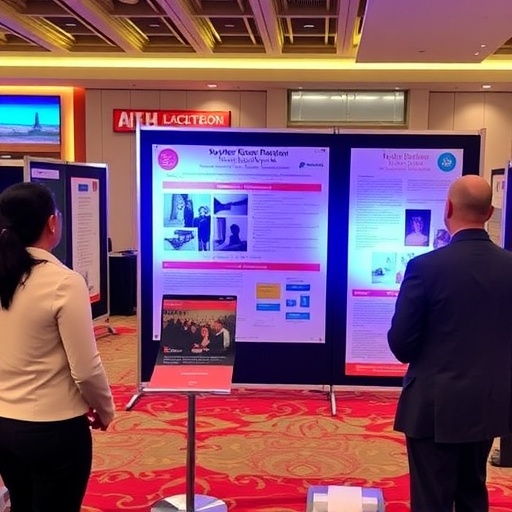In a groundbreaking showcase of hematologic research, more than 100 poster presentations involving investigators from the Sylvester Comprehensive Cancer Center and the University of Miami Miller School of Medicine are poised to unveil critical advances at the 67th Annual Meeting of the American Society of Hematology (ASH) in Orlando, Florida, from December 6-9, 2025. This monumental congregation of hematology experts highlights an array of pioneering studies spanning from molecular mechanisms of hematologic malignancies to innovative therapeutic interventions, underscoring the profound scientific momentum emanating from these institutions.
Central to this year’s presentations is a compelling exploration of coagulopathies linked with monoclonal gammopathies, where systematic analyses elucidate the underlying pathophysiological pathways. Dr. Tessa Lavorgna’s work on the direct inhibition of thrombin by paraproteins in multiple myeloma contributes significant mechanistic insights, potentially redefining therapeutic strategies to correct these rare hematologic complications. These findings promise to enhance patient management approaches by targeting the molecular drivers of coagulation abnormalities intrinsic to hematologic cancers.
Further accentuating the symposium are innovative investigations into von Willebrand disease (VWD), particularly severe cases being treated with novel therapeutic agents such as emicizumab. The EmiVWD study, documenting enrollment figures and preliminary outcomes for 2025, provides critical data on this therapeutic pioneer, which could revolutionize prophylactic treatment regimens by offering improved efficacy and safety profiles compared to traditional therapies. The cost-effectiveness analyses comparing prophylactic versus on-demand use of pdVWF/FVIII concentrates further deepen our understanding of healthcare resource allocation in VWD management.
Parallel to these hematologic disorder-focused studies, cutting-edge research into acute myeloid leukemia (AML) showcases the relentless pursuit of precision medicine. Efforts to identify novel druggable targets via advanced technologies like Npm1A-turboid fusion coupled with mass spectrometry stand at the forefront of combatting genetic or adaptive resistance to menin inhibitors in mutated NPM1 AML—a critical step toward overcoming therapeutic resistance. The Tuscan Study further validates the safety and efficacy of combining tuspetinib with standard venetoclax and azacitidine therapies, offering promising options for newly diagnosed AML patients ineligible for intensive chemotherapy.
Delving into mutation-driven disease courses, presentations detail the impact of BCR::ABL1 mutations conferring resistance to asciminib and cross-resistance to novel allosteric tyrosine kinase inhibitors such as TGRX-678. These findings underscore the ever-evolving landscape of kinase inhibitor resistance and spotlight the necessity for continuous molecular surveillance to guide tailored therapies. Complementary phase I and IB clinical trials exploring pegargiminase in combo treatments and peposertib with MEC protocols offer crucial early-phase safety and efficacy data, expanding the therapeutic arsenal against relapse and refractory AML.
In the domain of lymphomas, researchers contribute transformative insights into genomic and transcriptomic landscapes of extranodal marginal zone lymphoma and the molecular underpinnings of Epstein-Barr virus-associated polymorphic lymphoproliferative disorder. These studies not only enrich the biological understanding but also sharpen prognostic stratifications through tools like FLIPI24, enhancing clinical decision-making frameworks for marginal zone lymphoma. Assessments of CD30-directed CAR-T cell therapies, with long-term follow-ups on trials like CHARIOT, illustrate the advances in immunotherapeutic strategies against refractory Hodgkin lymphoma.
Another significant focus is on multiple myeloma (MM), assessed through multi-omics approaches and clinical trials of novel agents. Single-cell DNA sequencing uncovers intricate synergistic co-mutations and genetic heterogeneity influencing disease progression and drug responses, charting paths for personalized medicine. Studies examining the metabolism-driven epigenetic rewiring via vitamin B12 and the interplay with Tet2-deficiency emphasize the critical role of metabolic-epigenomic crosstalk in leukemogenesis, expanding potential avenues for targeted interventions.
The meeting also gives prominence to the evolving landscape of immunotherapies beyond CAR-T cells. Investigations into bispecific T-cell engager therapies, dual BET and p300 inhibition, and clinical evaluations of emerging agents like elranatamab reveal transformational shifts toward combinatorial and targeted immune strategies. Additionally, real-world data analyses on treatment patterns and survival outcomes, notably in older adults with myelodysplastic syndromes (MDS) and peripheral T-cell lymphomas (PTCL), provide invaluable perspectives on therapeutic efficacy and comorbidity impacts in diverse patient populations.
Technological innovations are pervasive in these presentations, including the application of artificial intelligence for diagnosis and prognosis in MDS, as well as computational modeling to derive novel risk stratifications in high-risk MM datasets. These advances highlight the integration of data science into hematology, enhancing diagnostic precision and individualized patient care.
The ASH 2025 conference also spotlights pivotal special sessions addressing frontiers such as menin inhibitors in AML treatment, modern risk-adapted therapies for MDS encapsulated by the MASTER MDS program, and updated clinical practice guidelines tailored for older adults with AML. These focused dialogues spearheaded by Sylvester and University of Miami leaders like Dr. Justin Watts and Dr. Mikkael Sekeres reinforce the commitment to translating scientific breakthroughs into clinical excellence.
In sum, the extensive array of research emanating from Sylvester Comprehensive Cancer Center and the University of Miami Miller School of Medicine at ASH 2025 epitomizes the dynamic and multidisciplinary evolution of hematology. The diversity of studies—from molecular dissection of malignancies to pragmatic clinical trials and health economics analyses—reflects a comprehensive approach to tackling the complex challenges of blood diseases. This convergence of innovation, clinical insight, and translational science promises to reshape therapeutic paradigms and patient outcomes in hematologic oncology for years to come.
Subject of Research: Hematologic malignancies and blood disorders, including novel therapeutics and molecular mechanisms in diseases such as AML, multiple myeloma, lymphomas, and coagulation disorders.
Article Title: Sylvester Comprehensive Cancer Center and University of Miami Present Over 100 Cutting-Edge Hematology Abstracts at ASH 2025
News Publication Date: November 13, 2025
Web References: https://umiamihealth.org/sylvester-comprehensive-cancer-center; https://meetings-api.hematology.org/api/abstract
Image Credits: Photo by Sylvester Comprehensive Cancer Center
Keywords: Blood diseases, Hemophilia, Cancer, Blood cancer, Leukemia, Myeloid leukemia, Lymphoma, B cell lymphoma, T cell lymphoma, Myeloma
Tags: ASH 2025 Annual Meetingemicizumab clinical studyhematologic malignancies researchhematologic research advancementsinnovative therapeutic interventionsmolecular mechanisms of coagulationmonoclonal gammopathies coagulopathiespatient management in hematologySylvester Comprehensive Cancer Centerthrombin inhibition in multiple myelomaUniversity of Miami Miller School of Medicinevon Willebrand disease treatment





